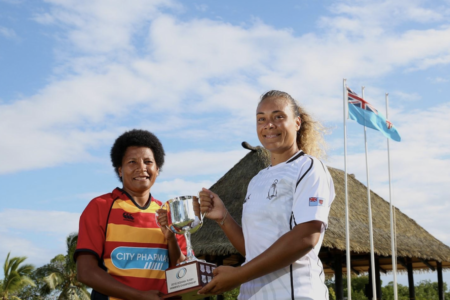As women rugby players there are four main challenges that we face – challenges that I believe are more directed towards our sport than other more gender-stereotyped sports geared towards women such as netball or hockey.
1. Disapproval
Firstly there’s the disapproval. From the wider society – and then there’s the disapproval that comes from within our player’s own families. There’s the ridicule we get from men. There’s gender inequality at an institutional level – and of course, there’s the belief in the Pacific that all-female rugby players belong to a certain sexual orientation just because we play the sport.
Needless to say, there’s a lot of girls who really want to play rugby but communities and families see it as unladylike, that we’re trying to be like the boys, and that it’s an unsafe sport for women to play due to the physicality.
Rugby has always been male-dominated sport and today it’s still largely seen as a male domain. In terms of gender, especially in countries like Fiji, culturally men have always had their set roles within the community with women their own role to play. For instance, women are expected to stay home, clean cook and look after the families – while the men work and provide for their families and have the freedom in most cases to play sport etc once they are married.
So this can often result in all these talented girls who want to play rugby – but don’t because their families, and society, are against it.
2. Ridicule
As women rugby players in the past, we use to get ridiculed by the men and spectators a lot and whilst it has improved there is still a way to go. For instance, it was not unheard of when we have had players go out on the field for comments like “go back to the kitchen”, “what are you doing here?”, and “you shouldn’t be playing, this is for men only” to be heard. And heaven forbid you made a mistake – like you missed a tackle or knock on the ball; – you’d have people pointing and laughing.
There has, however, been a lot of wonderful work that has been carried out by Fiji Rugby Union, Oceania Rugby, New Zealand Rugby and Australia Rugby through the education of both genders involved in the sport from players, to coaches, to teaches & unions which has been very positive and as a result we have seen an increase in girls and women participating & accepted in rugby which is great.
This coupled with the fact that our national women’s teams have been performing quite well on the international stage has allowed spectators to respect and support the players more for their skills and talents which is a welcome change.
3. Gender Inequality
Gender inequality at an institutional level is another challenge; it’s so much harder for women’s clubs and teams to get financial support and sponsorship. A lot of the women’s clubs have to do our own fundraising such as making food to sell, raffles, walkathons etc. It’s just a lot easier for male-lead clubs to get this support.
Yes, it is true that some people still believe women rugby players are all from a certain sexual orientation – that we’re all gay just because we play rugby. Which leads them to think “that they don’t want their daughter being associated with the sport”. Because playing women’s rugby could ‘make’ them gay. Contrary to popular belief this is false. Many women ruggers have their own families, children, supportive husbands or boyfriends myself included.
My message to people who think like this is you need to open your mind, we are living in the 21st century in a world made up of many different people of which no one should be discriminated against because of their socioeconomic status, marital status, disability or sexual orientation especially not in sport. It’s about time we change the mindset and understand that rugby is a sport for everybody.
4. Safety
When it comes to safety – there are associated risks in any sport you do and these same risks face both men and women rugby players irrespective of their sex. To best equip all players it’s all about having the proper training – learning the key factors so players know how to run into defence, tackle properly, fall properly etc thus minimizing this risk. It also comes down to creating a safe environment both on and off the fields for our players and educating players so they understand what they need to do and don’t to enable them to perform to their best ability and safeguard themselves.
You ask how does it affect me when people say negative things to me about the above challenges we women ruggers face or if I’m on the receiving end of these negative comments. Quite honestly, I have thick skin and I don’t take it personally but I see it more of an opportunity to make a change – if given the chance I would go up and talk to those people making such comments to get an understanding of how they came to form their opinion and enlighten them to the reality of the situation. It’s never too late to bring someone over to the women’s rugby side!

